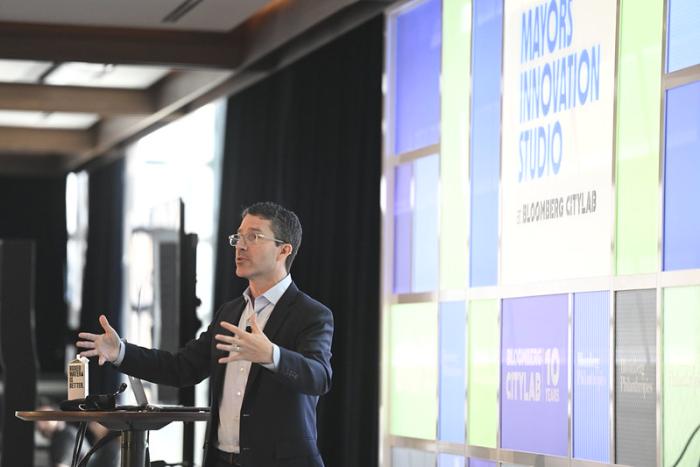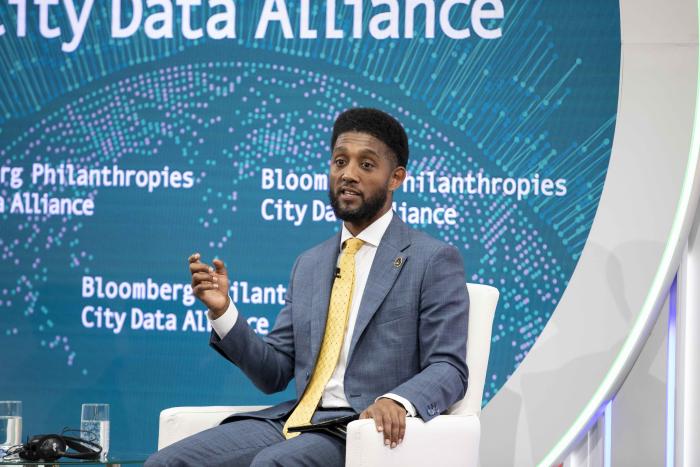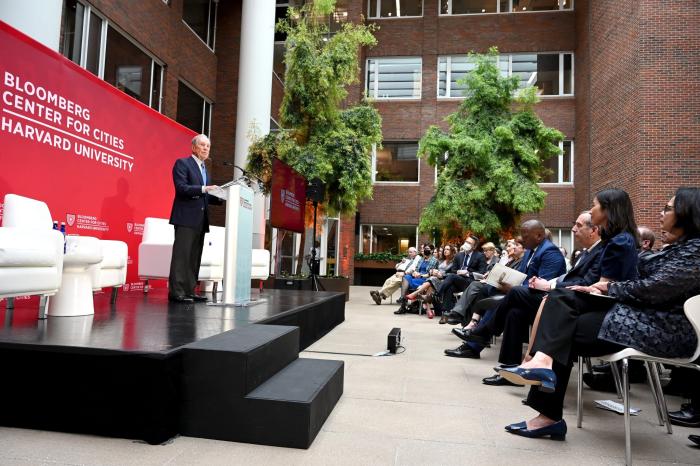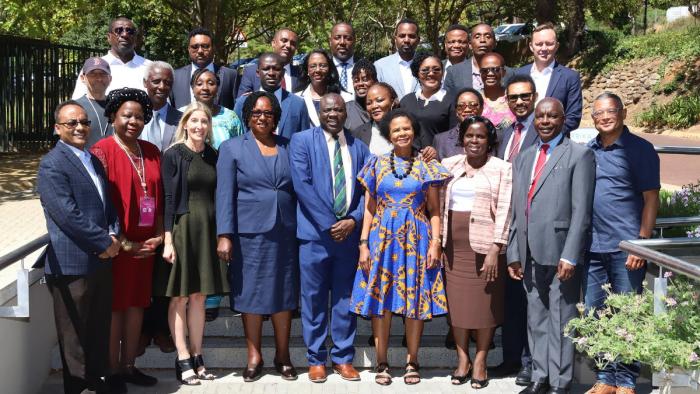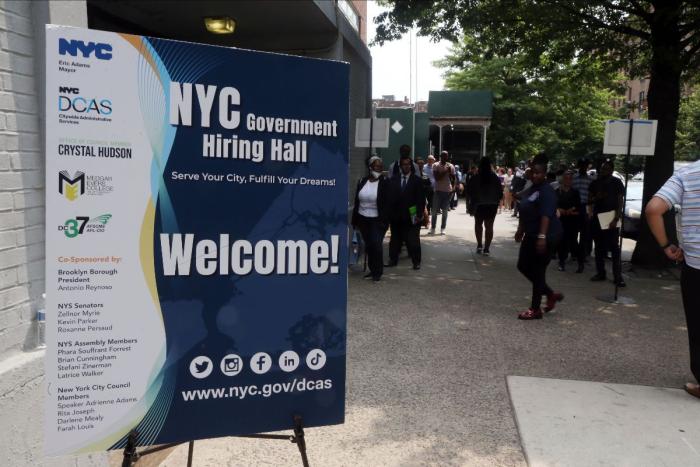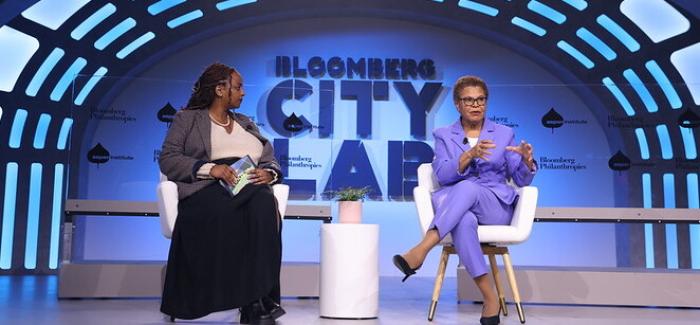 Read More
Read More
8 ways Bloomberg Philanthropies advanced public innovation in 2023

At Bloomberg Philanthropies, we know that city leaders are on the frontlines of the world's greatest challenges. We also know that they're the source of some of the most ambitious solutions and, at the same time, too often lack the resources needed to put those ideas into action.
Philanthropy can play an important role in bridging that gap, by helping local leaders develop critical problem-solving capabilities, by demonstrating what’s possible, and by creating spaces for mayors and their teams to connect—and share—with peers from other cities.
That understanding is at the core of our decade-plus support of cities, which is focused on developing better public-sector leaders, inspiring ambitious policy innovation, building more effective city halls, and spreading great ideas at scale. It was also at the heart of eight of our most significant priorities throughout 2023.
Accelerating the spread of ideas between cities
The pace of change—and the need for fast action—is so great today that one of the best ways cities can respond is to uncover, adopt, and adapt proven solutions. That's why we launched the Bloomberg Cities Idea Exchange, a $50-million initiative aimed at turbocharging the spread of great ideas between cities around the world. The program, which has drawn interest from hundreds of cities, will offer matching grants, ideas tours, multi-year technical assistance, an ideas evaluation fund, and much more to help cities find, quickly adapt, and implement good ideas. As Mayor Randall Woodfin of Birmingham, Ala., put it at Bloomberg CityLab 2023, if mayors can borrow "a best model [from] somewhere else, it accelerates your ability to scale it for your community, your city."
Learn more:
Michael R. Bloomberg on The economy of urban replication: Why cities need to be sharing ideas
Capitalizing on historic infrastructure opportunities
This year, city leaders across the United States were laser-focused on unlocking opportunities presented by once-in-a-generation levels of federal infrastructure dollars available to them. Our Local Infrastructure Hub, which provides leaders of small and medium-sized cities resources and pro-bono expertise to make effective grant applications, is helping them have a major impact. We’ve delivered more than 21,000 hours of support to 1,200-plus cities, helping shape the way some $19.6 billion in American Rescue Plan Act (ARPA) funds have been spent—and helping cities win more than $1 billion in competitive grants. Along the way, we’ve made a point of providing support to cities that might not, typically, be at the front of the line for infrastructure dollars.
We’ve also helped accelerate cities' leadership in cycling infrastructure around the world: In June, 10 cities from 10 countries and five continents were named winners of the Bloomberg Initiative for Cycling Infrastructure and awarded grants of up to $1 million to build innovative cycling infrastructure and sustainable mobility options for residents.
Learn more:
Small towns, big dreams—Lessons in implementing Washington's infrastructure vision
Analysis: How global cities are raising their cycling infrastructure ambitions
Exploring Generative AI’s potential
With artificial intelligence gaining currency across society, we launched City AI Connect, a single destination where city leaders worldwide can explore, build, and trial new utilizations with peers across cities. Already, some 270 local and civil servants from 182 cities are using it. Our work here is based, in part, on what we learned from a survey we conducted to gauge mayors’ and city leaders’ ambitions and hesitations around generative AI. One key finding: The vast majority were exploring or testing how to use the technology in their cities, but only 13 percent had fleshed out policies and guidelines around its use, with many expressing substantive concerns around transparency and privacy. So, after a 2023 Mayors Innovation Studio (MIS) at Bloomberg CityLab that explored these issues and offered guidance, CityAI Connect now offers city leaders everywhere social networking features, digital forums, virtual events, and a cache of blueprints and resources to help them exchange strategies and work with data and technology experts to determine how generative AI might be of use for their residents.
Learn more:
Cities are ramping up to make the most of generative AI
Doubling down on data
When Seattle Mayor Bruce Harrell unveiled his city’s One Seattle Data Strategy with our support earlier this month, his city became the latest to advance data use in local government—from pockets of excellence in city bureaucracies to a whole-of-government approach that is enshrined in city halls. Cities have strengthened their data capacities—through excellent data analytics shops and chief data officers—for more than a decade now. But their efforts too often remain relatively siloed, disconnected from urgent priorities like migration or climate change, and/or are operating at sub-scale levels. With other cities like Scottsdale, Ariz., Charleston, S.C., and Montevideo, Uruguay, having already launched their own citywide strategies, our ambition—channeled through programs like the City Data Alliance—is to help make data a formally established part of governing in the realm of official policy, rather than any given administration’s priority.
Learn more:
5 data practices that demonstrate “what’s next” for cities everywhere
Opened the Bloomberg Center for Cities at Harvard University
To best prepare today's city leaders—and to develop the next generation of them—we launched the Bloomberg Center for Cities at Harvard University. Powered by a slate of new faculty endowments and fellows who are on the frontlines of public-sector innovation, the center is a resource available to city leaders across the world determined to make local government smarter and more effective. As Stephen Benjamin, the former mayor of Columbia, S.C., explained, "The opening of the Bloomberg Center for Cities—and the Center’s expanding activities—will provide even more mayors, local officials, and future public-sector leaders with extraordinary opportunities to develop executive leadership skills and learn new strategies for tackling the sweeping challenges we face."
Learn more:
First on Axios: A home for Bloomberg's "Center for Cities" at Harvard
Offering mayoral training on a global scale
Seven years after the launch of the Bloomberg Harvard City Leadership Initiative, nearly 20 percent of all Americans live in a city where a mayor, past or current, has participated—bringing new skills and capacities back to their residents. But our emphasis with this work has never been about imposing it from on high in a one-size-fits-all fashion. That's why we’re also expanding these efforts globally, in close cooperation and coordination with new local partners and practitioners. In 2023, that included teaming up with Big Win Philanthropy and the University of Cape Town to launch the African Mayoral Leadership Initiative (AMALI) and the AMALI Data Program, which is providing mayors who have their own unique local contexts and needs with coaching and technical assistance to build data-empowered cities.
Learn more:
Mike Bloomberg’s organization is guiding hundreds of mayors across the country
Tackling the mounting talent crisis
Cities worldwide face unprecedented challenges in recruiting, retaining, and supporting top talent, and that talent is what makes public-sector progress possible. This crisis drew 58 leaders from 15 global cities to the first Talent Management in City Government training at the Bloomberg Center for Cities at Harvard. The program, which focused on equipping teams with cutting-edge recruitment and retention skills, emphasized the value for cities in approaching talent management with a cohesive strategy and ensuring new hires fit into broader policy objectives and administrative ambitions.
Learn more:
How cities can take on the mounting talent crisis
Celebrated the 10th Bloomberg CityLab summit
The hundreds of city leaders, urban thinkers, and artists who came together in Washington, D.C., in October for the 10th Bloomberg CityLab summit had a front-row seat for some of the boldest insights and ideas in public-sector innovation. Those included strategies shared by Mitch Landrieu and Pete Buttigieg—both former mayors and Bloomberg Cities program participants and now President Biden’s infrastructure coordinator and transportation secretary, respectively—on how cities can best access and deploy infrastructure dollars. They also included conversations with mayors such as D.C.’s Muriel Bowser, who announced a new initiative to incentivize graduates of local Historically Black Colleges and Universities to pursue careers in city government, and Los Angeles’ Karen Bass, who described the cutting-edge approaches her administration is taking in the face of one of its greatest priorities: homelessness.
Learn more:
10 memorable moments from Bloomberg CityLab 2023
James Anderson leads the Government Innovation program at Bloomberg Philanthropies.


